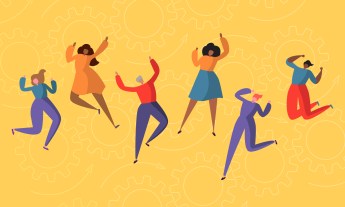
The key to harnessing self-doubt starts with self-efficacy, or our confidence in our ability to set ourselves up for success. And we can improve self-efficacy through something that we all already do: talk to ourselves, says writer Rich Karlgaard.
We live in a society where people are obsessed with early achievement, but most of us don’t explode out of the gates right away. That was true for Rich Karlgaard. After a mediocre college career, he worked as a dishwasher, nightwatchman, and temp before finally finding inner motivation and drive. These qualities led him to start a tech magazine in Silicon Valley, and he eventually became the publisher of Forbes. He has conducted years of research and interviews to find out why some of us bloom later in life — and how we can all achieve our full potential. Below, he writes about the unlikely power to be found in self-doubt.
Most of us allow far too much self-doubt into our lives. But for late bloomers, self-doubt can seem a heavier load. We often start out in a hole by undervaluing our abilities and contributions, which inflicts many different kinds of pain, from panic to paralysis to embarrassment. But the long-term damage is even worse. Left to fester, self-doubt can prevent us from realizing our full potential. That’s the bad news.
The good news is that self-doubt, odd as it may sound, is actually a secret weapon for blooming. When properly managed, it can help combat complacency and improve our preparation and performance. It drives us to question results, experiment with new strategies, and be open to alternate ways to solve problems — tactics that correlate with late bloomer strengths such as curiosity and resilience. But self-doubt isn’t only a performance enhancer; it’s also a recipe for being a wiser leader, teacher, parent and friend, because coming to terms with it makes us more compassionate and gives us greater insight into ourselves and others. The problem is that many people deal with self-doubt by sabotaging our chances of success.
The key to harnessing self-doubt starts at the very core of our individual beliefs about ourselves.
When discussing self-doubt, the popular advice is that we just need more of the opposite: more confidence, more assurance, more chutzpah. But the issue with confidence is how we try to achieve it. Too often, we try to win high self-regard in cheap ways. We undermine others, or we compare our achievements to those of the weakest around us. We conform to cultural norms, believing what society values is what we value and how society defines success is how we must define success. These cheap tricks are unsustainable and lead to narcissism during good times and depression during hard times.
Self-doubt is normal. It’s a mistake to believe that you, me, or any of us are alone in facing this problem. Popular musicians, world-renowned brain surgeons, and even the brightest and most creative aren’t immune to this nagging sense of dread. The late author Maya Angelou once confessed, “I have written 11 books, but each time I think, ‘Uh-oh, they’re going to find out now. I’ve run a game on everybody, and they’re going to find me out.’”
To bloom, we must learn not to fear self-doubt but to embrace it as a naturally occurring opportunity for growth and improvement. The key to harnessing self-doubt starts at the very core of our individual beliefs about ourselves, with what psychologists call “self-efficacy.” And understanding self-efficacy begins with Albert Bandura.
High self-efficacy is good because unless we truly believe we can produce the result we want, we have little incentive to try in the first place.
In the field of psychology, Albert Bandura is a giant. In 2002 Bandura was ranked the fourth most important psychologist of the 20th century by the Review of General Psychology. Only B. F. Skinner, Jean Piaget, and Sigmund Freud ranked higher than Bandura, who achieved his exalted status for his theories on self-efficacy.
Bandura was born in 1925, in a small town on the windswept plains of Alberta, Canada. His early education occurred at a school with only two teachers. Because of limited resources, he says, “the students had to take charge of their own education.” Young Bandura realized that while “the content of most textbooks is perishable . . . the tools of self-directedness serve one well over time.” Fending for his own education undoubtedly contributed to his later emphasis on the importance of personal agency.
Bandura attended the University of British Columbia, where he graduated in only three years. After earning a Ph.D. in psychology at the University of Iowa, he was offered a position at Stanford University and began working there in 1953 — and he’s still there. His 1977 paper, “Self-Efficacy: Toward a Unifying Theory of Behavioral Change,” caused a huge shift in psychology. Since then, self-efficacy has become one of the field’s most studied topics.
Bandura has defined self-efficacy as confidence in one’s ability to develop strategies and complete tasks necessary to succeed in various endeavors. High self-efficacy is good because unless we truly believe we can produce the result we want, we have little incentive to try stuff in the first place or persevere in the face of challenges.
While we’ll still feel self-doubt even with high self-efficacy, we’ll find that we’re able to maintain our sense of personal agency.
Over the past few decades, multiple cross-sectional and longitudinal studies have proven that high self-efficacy has a positive influence on salary, job satisfaction, and career success. Why is it so important? All of us can identify goals that we want to accomplish or habits we’d like to change, but most of us realize that putting these plans into action is not quite so simple. Bandura and others have found self-efficacy plays a major role in how we approach goals and challenges. This is particularly true for late bloomers.
Due to society’s obsession with early achievement, late bloomers are often denied the two primary sources of a strong sense of self-efficacy: mastery experiences and social modeling. Mastery experiences are instances of mastering a task or achieving a goal, such as acing a class or test, dominating a sport, or nailing a job interview. Many late bloomers have fewer of these moments so we don’t experience the socially applauded outcomes that bolster self-efficacy. The other source of self-efficacy, social modeling, is when we see people similar to ourselves succeed, raising our belief that we too possess the capabilities to excel in life. However, late bloomer success stories garner little attention in our world, which focuses excessive attention on the precociously talented and youthfully ambitious.
While we’ll still feel self-doubt even with high self-efficacy, we’ll find that we’re able to maintain our sense of personal agency, the belief that we can take meaningful action. This belief is the very foundation of translating self-doubt into motivation and information.
Self-talk shapes our relationships with ourselves, allowing us to try to see things more objectively.
We can improve self-efficacy through something we already do: Talk. We all talk ourselves through situations, good and bad. It’s our inner cheerleader — or our inner critic. Psychologists and researchers call this voice “self-talk.” Self-talk shapes our relationships with ourselves, allowing us to try to see things more objectively. Objectivity can be enormously beneficial for late bloomers, helping us overcome the negative cultural messages we receive from family, friends and society.
Positive self-talk and its relationship to self-efficacy has been a topic of intense study for sports psychologists. Researcher Antonis Hatzigeorgiadis and his team at the University of Thessaly in Greece studied water polo players and how self-talk affected their ability in throwing a ball for accuracy and distance. The players using motivational self-talk significantly improved at both tasks versus the others, and the study showed that motivational self-talk dramatically increased both self-efficacy and performance. It also confirmed Bandura’s premise that increases in self-efficacy were related to improvements in performance.
The power of self-talk has been conclusively demonstrated in fields beyond sports, including management, counseling, psychology, education and communication. In studies, it has been shown to improve self-efficacy and performance in tasks ranging from throwing darts and softballs to increasing vertical leaps.
By using external pronouns, we view ourselves as a separate person, enabling us to give ourselves more objective advice.
How we refer to ourselves in our self-talk can also make a difference. Ethan Kross, director of the Self-Control and Emotion Laboratory at the University of Michigan, has found that people who speak to themselves as another person — using their own name or the pronoun “you” — perform better in stressful situations than people who used the first-person “I.”
In a study, Kross triggered stress in participants by telling them that they had just five minutes to prepare to give a speech to a panel of judges. Half the participants were told to try to temper their anxiety using the first-person pronoun: “Why am I so scared?” The other half were told to address themselves using their name or the pronoun “you”: “Why is Kathy so scared?” or “Why are you so scared?” After they each spoke, the participants were asked to estimate how much shame they experienced. People who used their names or “you” not only reported significantly less shame than those who used “I,” their performances were also consistently judged to be more confident and persuasive.
According to Kross, when people think of themselves as another person, “it allows them to give themselves objective, helpful feedback.” This is because they self-distance — they focus on themselves from the distanced perspective of a third person. “One of the key reasons why we’re able to advise others on a problem is because we’re not sucked into those problems,” explained Kross. “We can think more clearly because we have distance from the experience.” By using external pronouns, we view ourselves as a separate person, enabling us to give ourselves more objective advice.
The next time you’re frazzled and need a motivational pep talk, consider giving it to yourself in the second or third person. This can help you look at the situation from a logical, objective perspective rather than an emotional, biased one.
One caveat: Verbal encouragement of this kind isn’t about being a relentlessly optimistic cheerleader. It’s one thing to put a positive or constructive spin on a situation; it’s another thing to create unrealistic beliefs and expectations. Setbacks and mistakes are not to be brushed aside with a glib cliché. Instead, they’re moments for reflection and opportunities for learning. To get the greatest benefits from self-talk — or any sort of verbal encouragement — we need to develop statements that support a realistic self-image.
Excerpted with permission from the new book Late Bloomers: The Power of Patience in a World Obsessed with Early Achievement by Rich Karlgaard, published by Currency Books, an imprint of Penguin Random House LLC, New York. Copyright © 2019 Rich Karlgaard.
Watch Rich Karlgaard’s TEDxFargo talk on late bloomers now: https://www.ted.com/talks/rich_karlgaard_why_late_bloomers_are_undervalued














